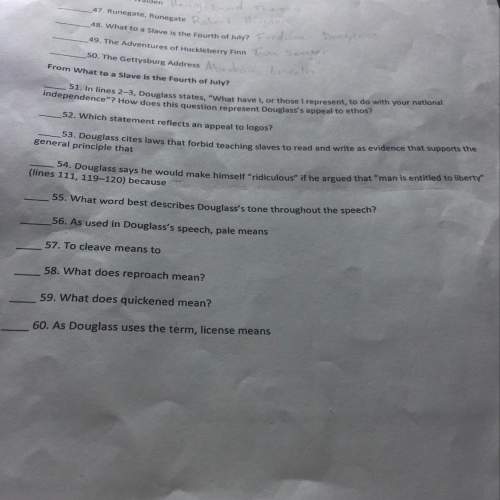
History, 13.11.2020 16:30 Aydenj9613
"These are the times that try men's souls. The summer soldier and the sunshine patriot will, in this crisis, shrink from the service of their country; but he that stands it now, deserves the love and thanks of man and woman." — Thomas Paine, The Crisis, 1775 At Valley Forge, George Washington read The Crisis to inspire — A his men to re-enlist in spite of suffering and hardships B rich merchants to leave the colonies, C Loyalists to support the King D the Spanish to unite against Great Britain

Answers: 2


Another question on History

History, 22.06.2019 02:00
Iam told that hundreds if not thousands of these (armenians) were sent at once to the front ranks at the dardanelles, where death in a very short space of time is almost a certainty. the older men were then deported into the interior, while the women and children, when not carried off in an opposite direction, were left to shift for themselves as best they could. the terrible feature of this deportation up to date is that it has been carried out on such a basis as to render it practically impossible in thousands of cases that these families can ever again be reunited. not only wives and husbands, brothers and sisters, but even mothers and their little children have been dispersed in such a manner as to preclude practically all hope that they will ever see each other again. according to this excerpt, what does the author consider to be the worst part of the deportation during the armenian genocide?
Answers: 1

History, 22.06.2019 06:40
Roosevelt's “four freedoms” speech relies so heavily on emotional appeal that its structure is missing .
Answers: 1

History, 22.06.2019 07:00
Excerpt from momotaro, or "little peachling" japanese folktale momotaro finding that he excelled every body in strength determined to cross over to the island of the devils, take their riches, and come back. he at once consulted with the old man and the old woman about the matter, and got them to make him some dumplings. these he put in his pouch. besides this he made every kind of preparation for his journey to the island of the devils and set out. then first a dog came to the side of the way and said; "momotaro! what have you there hanging at your belt? " he replied: "i have some of the very best japanese millet dumplings." "give me one and i will go with you," said the dog. so momotaro took a dumpling out of his pouch and gave it to the dog. then a monkey came and got one the same way. a pheasant also came flying and said: "give me a dumpling too, and i will go i along with you." so all three went along with him. in no time they arrived at the island of the devils, and at once broke through the front gate; momotaro first; then his three followers. here they met a great multitude of the devil's retainers who showed fight, but they pressed still inwards, and at last encountered the chief of the devils, called akandoji. then came the tug of war. akandoji made at momotaro with an iron club, but momotaro was ready for him, and dodged him adroitly. at last they grappled each other, and without difficulty momotaro just crushed down akandoji and tied him with a rope so tight that he could not even move. all this was done in a fair fight. what might reasonably be assumed about traditional japanese culture from this portion of the passage?
Answers: 3

History, 22.06.2019 09:00
Which answer best describes an advantage of shipping goods by canal? most towns would rather have canals than noisy railroads. goods could travel very fast downstream in the canal system. travelling by boat is a much more relaxing way to transport goods. heavy loads of goods could travel by boat more easily than if pulled by horses.
Answers: 1
You know the right answer?
"These are the times that try men's souls. The summer soldier and the sunshine patriot will, in this...
Questions


Computers and Technology, 29.06.2019 17:40




Social Studies, 29.06.2019 17:40


Biology, 29.06.2019 17:40






Biology, 29.06.2019 17:40



Health, 29.06.2019 17:40

Biology, 29.06.2019 17:40


Biology, 29.06.2019 17:40




